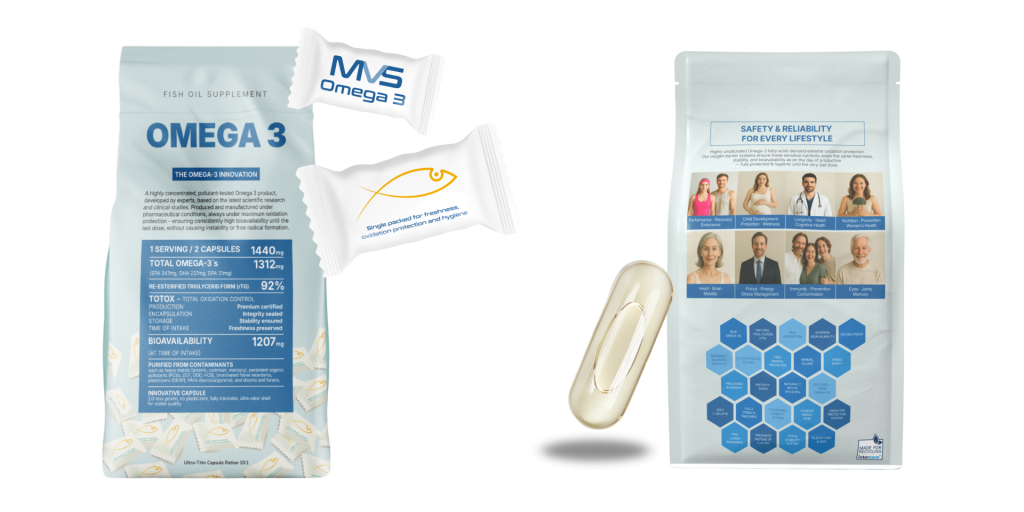Table of Contents
Omega-3 benefits elderly people overview: As individuals age, maintaining optimal health becomes increasingly important, and nutrition plays a pivotal role in supporting overall well-being. Omega-3 fatty acids, renowned for their numerous health benefits, emerge as key contributors to healthy aging. This comprehensive guide explores the importance of omega-3 for elderly people, outlining their impact on various aspects of health.
Benefits of Omega-3 for Elderly People
Elderly individuals benefit from omega-3 fatty acids for several reasons, making them a crucial dietary component for this demographic. Here are key reasons why omega-3s are essential for the elderly:
- Cognitive Health: Omega-3 fatty acids, particularly DHA, are integral to brain health. They support cognitive functions, enhance memory, and may reduce the risk of cognitive decline and neurodegenerative disorders like Alzheimer’s disease.
- Cardiovascular Support: Aging often brings an increased risk of cardiovascular issues. Omega-3s, specifically EPA and DHA, help maintain heart health by reducing inflammation, improving cholesterol levels, and supporting overall cardiovascular function.
- Joint and Bone Health: Elderly individuals commonly face challenges related to joint stiffness and bone health. Omega-3s exhibit anti-inflammatory properties, potentially alleviating joint pain and contributing to improved joint flexibility. Additionally, omega-3s support bone density.
- Vision Maintenance: DHA is a critical component of retinal tissue. Including omega-3s in the diet can contribute to maintaining optimal vision and reducing the risk of age-related macular degeneration.
- Mood and Emotional Well-Being: The aging process can be accompanied by changes in mood and emotional well-being. Omega-3s, especially EPA, play a role in supporting mental health and emotional balance, potentially alleviating symptoms of depression and anxiety.
- Immune System Support: As the immune system tends to weaken with age, omega-3s can help enhance immune function, reducing the risk of infections and promoting overall immune system efficiency.
- Inflammation Management: Chronic inflammation is associated with various age-related diseases. Omega-3s have anti-inflammatory properties that may help manage inflammation, contributing to overall health.
- Heart Rhythm Regulation: Omega-3s support the regulation of heart rhythm, reducing the risk of irregular heartbeats, which can be more prevalent in older individuals.
- Skin Health: Omega-3s contribute to skin hydration and may help manage skin conditions associated with aging, promoting healthier and more resilient skin.
- Reducing Medication Interactions: Omega-3 supplementation might provide an alternative or complementary approach to certain medications, reducing the risk of potential interactions and side effects.

How much Omega-3 is needed daily for elderly people?
The recommended daily dosage of omega-3 for elderly individuals can vary based on factors such as age, health status, and individual dietary habits. However, general guidelines suggest a daily intake of omega-3 fatty acids, particularly eicosapentaenoic acid (EPA) and docosahexaenoic acid (DHA), for optimal health benefits.
- Recommended daily dosage of Omega-3 for General Health Maintenance: EPA and DHA combined: 250–500 milligrams per day.
- Recommended daily dosage of Omega-3 For Specific Health Conditions
- Cognitive Health: Higher doses, such as 500-1,000 milligrams of DHA, may be recommended.
- Cardiovascular Health: Higher doses, often around 1,000 milligrams of combined EPA and DHA, may be recommended for individuals with cardiovascular concerns.
Consultation with Healthcare Professionals
- Individuals with specific health conditions or those taking medications should consult with healthcare providers for personalized recommendations.
- Omega-3 supplements may interact with certain medications, so healthcare professionals can provide guidance on safe and effective dosages.
Dietary Sources
1. Fatty Fish:
- Salmon
- Mackerel
- Sardines
- Herring
2. Plant-Based Sources:
- Flaxseeds
- Chia seeds
- Walnuts
- Hemp seeds
3. Supplements:
Omega-3 supplements, including fish oil or algae-based capsules, can be beneficial, especially for those who may have difficulty obtaining enough through dietary sources.
Considerations and Precautions
- Quality of Supplements: Choose high-quality Omega-3 supplements to ensure purity and avoid contaminants such as mercury, especially in fish oil supplements.
- Individual Health Conditions: Consult with a healthcare provider before starting Omega-3 supplementation, especially for individuals with existing health conditions or those taking medications, as Omega-3s may interact with certain drugs.
- Dosage: The appropriate dosage may vary based on individual health needs. A healthcare professional can provide personalized recommendations.
Balanced Diet:
While supplements can be beneficial, obtaining nutrients from a well-rounded diet is essential. Encourage a diverse and nutritious eating plan for overall health. If you want to know everything about Omega-3 fatty acids, just click here.
Conclusion
Omega-3 fatty acids are valuable allies in promoting the health and well-being of elderly individuals. From cardiovascular support to cognitive health, the benefits are diverse and significant. However, it’s crucial to approach Omega-3 supplementation with caution, considering individual health conditions and seeking professional guidance.
For elderly individuals, maintaining a diet rich in Omega-3s and consulting with a healthcare provider for personalized advice can contribute to a healthier and more fulfilling life in their later years. Always prioritize a holistic approach to senior health, encompassing nutrition, physical activity, and regular medical check-ups.
MVS Omega-3 — Setting a New Standard in Purity, Stability, and Bioavailability
Developed by MVS Pharma’s medical and pharmaceutical experts, MVS Omega-3 represents a new generation of scientifically designed Omega-3 supplements. With a 92% natural rTG structure, verified bioavailability of 1207 mg, and our proprietary T-TOX™ oxidation control system, it ensures exceptional purity, stability, and absorption. Each batch meets European Pharmacopeia standards and is tested for over 20 potential contaminants — setting a benchmark for transparency and trust in modern nutritional science.

Not all Omega-3 supplements are created equal. The more unsaturated and effective Omega-3 molecules become, the more sensitive they are to air exposure — making oxidation protection the single most critical factor for preserving both safety and bioavailability. Once oxidation begins, oil turns rancid, loses efficacy, and may even generate free radicals.
At MVS Pharma, this challenge defined our mission. We engineered MVS Omega-3 as a next-generation formulation designed for uncompromised purity, verified stability, and maximum biological usability.
MVS Omega-3 Key Facts:
- 90% Purified Omega-3 Concentration — delivering 1440 mg total oil with 1312 mg active Omega-3s (EPA 784 mg, DHA 518 mg) per serving.
- 92% Re-esterified Triglyceride (rTG) Form — structurally identical to natural fish oil for superior absorption (1207 mg bioavailable) and full physiological compatibility.
- T-TOX™ Total Oxidation Control System — exclusive German oxidation-management technology ensuring freshness and molecular integrity from production to the last capsule.
- Dual-Layer Packaging Protection — prevents oxidation, preserves hygiene, and guarantees stability throughout the product’s entire lifecycle.
- Ultra Thin Capsule Release 3.0™ — 2/3 less gelatin, no plasticizers, and >91% active ingredient load for transparency, purity, and optimized payload.
- Natural Tocopherol Matrix (α, β, γ, δ) — balanced antioxidant system calibrated to protect high-purity oil without destabilization.
- Pharma-Standard Purification & Testing — each batch is verified to meet European Pharmacopeia standards and is screened for over 20 contaminants, including heavy metals, PCBs, dioxins, PAHs, and plasticizers.
The result is an ultra-pure, oxidation-protected Omega-3 supplement that maintains its natural structure, freshness, and full efficacy until the final dose — ensuring consistent support for cardiovascular, cognitive, visual, and immune health.
Disclaimer:
As a service to our readers, MVS Pharma GmbH publishing provides access to our library of archived content in our blog. Please note the date of the last review or update on all articles. No content on this site should ever be used as a substitute for direct medical advice from your doctor or other qualified clinician.
- Sources:
- National library of medicine – “Effects of Omega-3 Fatty Acid Supplementation on Skeletal Muscle Mass and Strength in Adults: A Systematic Review”
- National library of medicine – “The Role of Physical Exercise and Omega-3 Fatty Acids in Depressive Illness in the Elderly”


